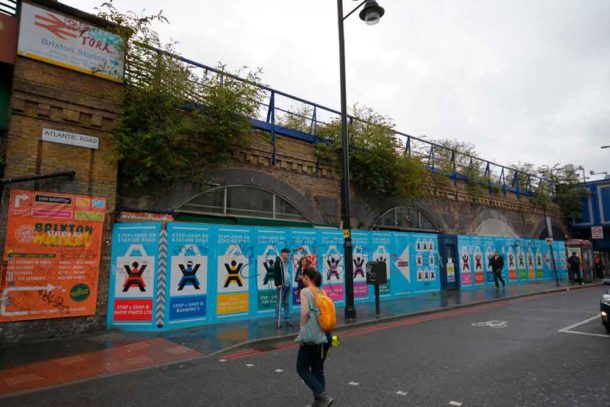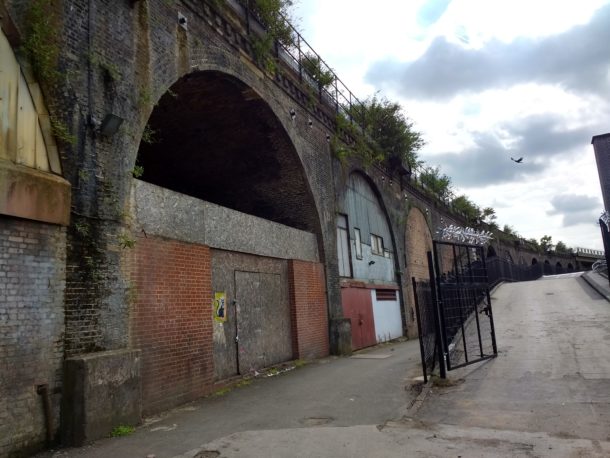
The new owners of thousands of railway arches, including those in Brixton and Herne Hill that are currently being controversially refurbished, have pledged to “remain particularly sensitive to the small businesses that have been long-term tenants of the Network Rail estate”.
Property companies Telereal Trillium and Blackstone have spent nearly £1.5 billion on Network Rail’s property estate. Most of the 5,200 properties involved are railway arches.
The sites are being sold leasehold, with Network Rail retaining access rights to operate the railway tracks it is responsible for.
Opposition to the sale from tenants was said earlier to have caused at least one potential buyer to drop out.
Guardians of the Arches, that coordinated the protests, said: “Throughout this process we have sought to ensure that small businesses are genuinely protected so that the arches can thrive. We continue to dispute whether selling off the whole estate in one job lot is the best way of supporting small businesses and the local economies which rely on them.
“There is a long way to go in the sale process, but if Blackstone and Telereal successfully purchase the estate, we trust they will follow up on their stated intention to put ‘tenants first’ in their management of the estate.
“A starting point would be to meet our demands for a full, transparent rent and lease audit, and to recognise Guardians of the Arches formally as a tenants’ association. We represent hundreds of businesses, and our number is growing every day. It is in the interests of all concerned that our proposals are taken on board.”
Guardians of the Arches set out its proposals for the future of the estate in a letter to Minister for London Jo Johnson in August. It has not yet had a response, despite media reports suggesting the government would intervene in the sale, and despite receiving assurances from the minister that its concerns would be taken on board.
David Biggs, managing director, Network Rail Property, said: “We are proud to have fostered so many small, independent, diverse businesses and communities across the country and we are confident that these will continue to thrive under the new owners.
“Ultimately our role is to run, improve and grow the railway, and managing these properties isn’t essential to that. The new owners will invest in and grow the estate, and we can focus on our core business of running the railway.”
Graham Edwards, co-founder and chairman of Telereal, said: “The arches portfolio is a unique and vital part of the UK economy. We are tremendously excited by the prospect of working with its entrepreneurial tenant base – made up of car mechanics, bakeries, micro-breweries, restaurants, and just about every type of business you can think of. These tenants are a vibrant part of many local economies and communities.
“As a long-standing real estate investor in the UK, we and our partner Blackstone believe that our ownership of the portfolio will provide the supportive environment in which these businesses can flourish on a long-term basis.
“For example, our business plan anticipates investing in several hundred currently disused arches so that they can provide space for more local businesses.”
Edwards said the new owners would be investing in the property portfolio “for many years”.
He said: “We believe that the long-term success of this portfolio rests on strong relationships with our tenants, as well as with local communities and local government.
“We intend to remain particularly sensitive to the small businesses that have been long-term tenants of the Network Rail estate.”
James Seppala, head of European real estate at Blackstone, said: “We are honoured to have been chosen as the new owners of Network Rail’s commercial estate.
“The portfolio is unique in its character and function, and we are excited by the tremendous opportunity for us to contribute to the continued revitalisation of the railway arches in the UK, always recognising the role that they play in stimulating economic activity, growth and prosperity, in particular amongst SMEs and local communities.”

Blackstone
Blackstone is the largest private equity real estate firm in the world, managing $119 billion of assets in North America, Europe, Asia and Latin America.
It says that it seeks to generate “attractive risk-adjusted returns” for investors and to acquire high quality investments at discounts to their replacement cost.
“We then improve the properties through hands-on management and targeted value-add initiatives. Our efforts result in solid returns for investors and strong economic assets for communities.”
Blackstone’s portfolio includes office, retail, hotel, industrial and residential properties.
Telereal Trillium
Telereal Trillium has a history of managing the properties of large public sector and privatised bodies, including the Department for Work & Pensions, BT, the Driver and Vehicle Licensing Agency (DVLA) and Royal Mail, as well as the giant multi-national insurer Aviva.
It says it has “an enviable track record in cost reduction, risk management, capital release and business transformation”.
Tenants’ charter
The new owners will publish a “tenants’ charter” and say they will “act with respect” towards tenants and provide them with an opportunity to raise concerns before any rent review and to take those concerns into account.
They intend to carry out a “comprehensive tenant consultation” (CTC) “so that we better understand the considerations and concerns of tenants, and the communities they serve”, promising that “every tenant will be contacted directly and given the opportunity to provide their thoughts and feedback”. This will be used to develop the charter.
Blackstone and Telereal Trillium say they are aware that recent increases in market rents have created financial pressures for some tenants.
They say they will seek to work with long-tenured small business tenants facing financial pressure.
They will also consider new structures to provide financial or other support to these tenants in recognition of their vital role for commercial estate and local communities. Further details are due to be announced after the transaction is completed and the CTC has taken place.
The partners will pay £1.46 billion for Network Rail’s property portfolio. The deal excludes properties in Scotland and those needed to support the running of railways.






